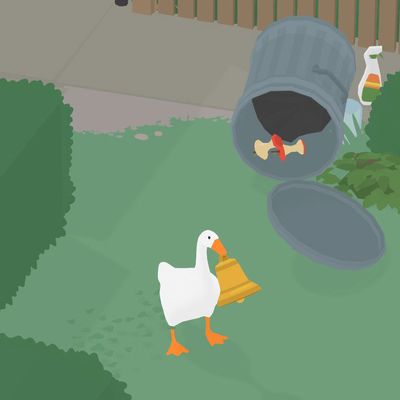
People are going nuts for Untitled Goose Game, which is, to be clear, a game for PC and Nintendo Switch in which you play as a goose. The game, released on Friday, has captured hearts and minds with its simple premise: You are a goose, and your job is to make life hell for everyone around you. The game is a blank canvas. Its absence of explicit motivation or an even vaguely descriptive title gives players license to graft whatever worldview they want onto their goose. Even the game’s inception was largely arbitrary, a nonsense Slack chat in which the developers pointed out their favorite goose attributes based on a stock-photo prompt.
Like a meme template, the goose is whatever you want it to be. Maybe for you, Goose is a casual game that you can complete in a couple of hours, or maybe Goose heralds a new era of deep, goose-based stealth action like Metal Gear or Hitman. The goose’s disrespect for private property has turned it into a leftist icon. Or, if you prefer, the goose’s self-centered approach represents the winner-take-all philosophy necessary to thrive in an unrepentantly capitalist age. Goose is in the eye of the beholder.
The premise is fairly straightforward: You control a goose and can perform a handful of actions. The main two are picking stuff up with your beak and honking. Using these two actions, the player controlling the goose causes havoc in a small countryside town, indirectly driving the townspeople through the environment as they chase the goose around, trying to repair the damage. Your main task, in almost every scenario, is to steal something from the townspeople or trap them in a room. In one early puzzle, honking at just the right time startles a gardener into driving a hammer down on his own thumb. It’s that sort of scheming.
It’s a deceptively simple formula that never wears thin, and the best way to play Untitled Goose Game is in a single two-hour sitting. Part of the reason for this is that the game is structured as a single piece of land, with small sections in it, and they all seamlessly blend together, providing little slices of life. There’s a quaint town square, for instance, but traveling through the alley behind it takes you to two bickering neighbors. It’s a game that lets you amble down the sidewalk and through holes in fences to dish out benign harassment.
The seamlessness of its small-village setting is a large part of what makes Untitled Goose Game (I feel obligated to add that it is subtitled “Mischievous Goose is Comin’!” in Japanese) a great one-session game, but the other great trick of Untitled Goose Game is that there is no game-over state: You can beat the game, but can’t die or otherwise cease to be while playing through it, and there is almost no penalty for failing whatever plan you might attempt to pull off. The game can be opaque about cause and effect — how non-geese react to different stimuli is established through trial and error — and this creates a pleasant, meandering sensibility as you try different things out. Maybe honking is the right move; maybe there’s something to pick up; maybe if you spread your wings, it’ll get a reaction. (There is a button dedicated to this purpose.). Even when you’re accomplishing nothing, or taking a break to glide majestically in circles around a pond, you feel like you’re doing something.
For example: Each vignette gives you a list of tasks to accomplish as the goose, and one of these tasks is a scavenger hunt that asks you to gather a handful of items. In the first section of the game, my goose was asked to gather a picnic by stealing a sandwich, a basket, and some produce items. Every time I gathered a new item, being careful to steal it without the gardener noticing, the man would still eventually follow me to the blanket and pick up one of his things. There is no way to steal everything faster than he can take something back. And yet, I kept trying. Even in failure, it was delightful to watch my horrible goose torture this old man, who was trapped in a Sisyphean cycle of endlessly trying to take back his carrots.
You repeat these basic shenanigans in a number of inventive contexts for a couple of hours, and then the game wraps up, smartly refusing to overstay its welcome. Perhaps this is the appeal of Untitled Goose Game. It allows you to play as the ultimate villain and a master tactician, in a world where the most pressing need for those traits is in service of moving around a few household objects and being a minor inconvenience. It’s a world in which the worst thing that can happen is that someone loses their keys.

